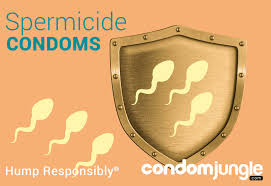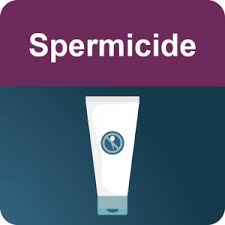Unveiling the Dynamics of Spermicide: A Comprehensive Exploration
Spermicides are contraceptive substances designed to prevent pregnancy by immobilizing or killing sperm. Available in various forms such as creams, gels, foams, films, and suppositories, they are applied to the vagina before sexual intercourse. While providing a non-hormonal, localized option for birth control, spermicides may cause irritation and have lower efficacy when used alone. Some formulations contain nonoxynol-9, associated with an increased risk of STIs. Proper usage, potential risks, and considerations should be discussed with healthcare professionals.
Understanding Spermicides: Types, Usage, and Considerations.

In the realm of contraceptive choices, the landscape is rich and varied, offering individuals the agency to make informed decisions about their reproductive health. Among the myriad options available, spermicides stand as a stalwart, providing a unique approach to prevent unwanted pregnancies. This article delves into the intricacies of spermicides, exploring their mechanisms, types, effectiveness, and potential considerations.
Body:
- Understanding Spermicides:
Spermicides are chemical agents designed to incapacitate or kill sperm, thus preventing them from reaching and fertilizing an egg. Typically available in various forms such as creams, gels, foams, films, and suppositories, these products are directly applied to the vagina before sexual intercourse.
- Mechanisms of Action:
Spermicides primarily work through two mechanisms – chemical and physical. Chemical spermicides contain active ingredients, such as nonoxynol-9, which disrupt the sperm cell membrane, rendering them immobile. Physical barriers, on the other hand, prevent sperm from entering the cervix.
- Types of Spermicides:
- Nonoxynol-9-Based Products: Nonoxynol-9, a common ingredient in many spermicides, is effective in neutralizing sperm. However, it's essential to note that excessive use may cause irritation and increase the risk of sexually transmitted infections (STIs).
- Alternative Formulations: Some newer formulations use alternative compounds, such as octoxynol-9, which aims to reduce irritation associated with nonoxynol-9.
- Effectiveness and Considerations:
- Effectiveness in Isolation: Spermicides, when used alone, are generally less effective than some other forms of contraception. Their efficacy can vary, and correct usage is crucial for optimal results.
- Combination with Other Methods: Spermicides can be more effective when used in conjunction with other contraceptives, such as condoms, providing an additional layer of protection.
- Considerations and Risks: Users should be aware of potential risks, including irritation or allergic reactions. Moreover, some studies suggest that frequent use of nonoxynol-9 may increase the risk of HIV transmission, emphasizing the importance of balanced decision-making.

How to Use Spermicides:
- Pre-Application Preparation:
- Wash hands thoroughly before application to ensure cleanliness and reduce the risk of introducing bacteria into the vaginal area.
- Correct Placement:
- Depending on the form (cream, gel, foam, or suppository), follow the instructions carefully for correct placement in the vagina, ideally close to the cervix.
- Timing:
- Spermicides need to be applied shortly before each act of sexual intercourse, allowing sufficient time for the product to disperse and create a barrier against sperm.
- Consideration for Multiple Acts:
- If engaging in repeated acts of intercourse, additional spermicide application is recommended to maintain effectiveness.
Benefits of Spermicides:
- Non-Hormonal Option:
- Ideal for individuals who cannot or prefer not to use hormonal contraceptives, as spermicides do not interfere with the body's hormonal balance.
- Localized Application:
- Provides a targeted approach to contraception, acting primarily in the vaginal area and requiring no systemic absorption.
- Convenience:
- Readily available over-the-counter without the need for a prescription, offering a convenient option for spontaneous use.
Risks and Effectiveness:
- Irritation and Allergic Reactions:
- Some users may experience irritation or allergic reactions to the active ingredients, emphasizing the importance of monitoring for adverse effects.
- Increased Risk of STIs:
- Studies suggest that frequent use of nonoxynol-9 may increase the risk of sexually transmitted infections (STIs) and HIV transmission, underscoring the need for additional protective measures.
- Varied Effectiveness:
- Spermicides, when used alone, may have lower effectiveness compared to certain hormonal or barrier methods. Their efficacy can be influenced by correct usage and individual facts.
What is the use of spermicide?
Why is spermicide not recommended?
Does spermicide affect pregnancy?
Does spermicide work better than condoms?
How effective is spermicidal gel?
How do you insert spermicide gel?
Does spermicide destroy sperm?
Is spermicide safe to use?
Is there a pill that kills sperm?
What are the disadvantages of spermicide?
Which spermicide is best?
Who should not use spermicide?
Can spermicide cause UTI?
What kills sperm?
Do condoms have spermicide?
Is boric acid a spermicide?
What is a natural spermicide?
How many condoms do you use in a night?
Which condoms have spermicide?
Can a girl push sperm out and not get pregnant?
Does urination flush out sperm?
Is coconut oil OK for sperm?
Is Durex a spermicide?
How much does spermicide cost?
Advantages and disadvantages of spermicide
1. What is the use of spermicide?

Spermicides are contraceptive substances designed to immobilize or kill sperm, preventing them from reaching and fertilizing an egg. They come in various forms, including creams, gels, foams, films, and suppositories, and are applied to the vagina before sexual intercourse.
2. Why is spermicide not recommended?
Spermicides are not universally recommended due to several factors. They may cause irritation or allergic reactions in some individuals, and frequent use of nonoxynol-9 (a common spermicidal agent) has been associated with an increased risk of sexually transmitted infections (STIs) and HIV transmission. Additionally, their effectiveness, especially when used alone, is lower compared to some other contraceptive methods.
3. Does spermicide affect pregnancy?
Yes, spermicides are designed to prevent pregnancy by immobilizing or killing sperm. When used correctly and consistently, they can be effective in reducing the risk of pregnancy.
4. Does spermicide work better than condoms?
Spermicides are often used in conjunction with condoms to provide dual protection against pregnancy. Using both methods together may offer increased efficacy compared to using spermicides or condoms alone.
5. How effective is spermicidal gel?
The effectiveness of spermicidal gel can vary. When used alone, spermicidal gel may have a higher failure rate than some other contraceptive methods. However, its effectiveness can be enhanced when used in combination with other methods, such as condoms.
6. How do you insert spermicide gel?
Spermicidal gel is typically inserted into the vagina close to the cervix before sexual intercourse. Follow the product's instructions for proper application, and be sure to apply it shortly before each act of intercourse for optimal effectiveness.
7. Does spermicide destroy sperm?
Yes, spermicides contain active ingredients, such as nonoxynol-9, that work to immobilize or kill sperm, preventing them from reaching and fertilizing an egg.
8. Is spermicide safe to use?
Spermicides are generally considered safe for most individuals. However, some people may experience irritation or allergic reactions to the active ingredients. It's important to follow instructions for use and consult with a healthcare professional if any adverse reactions occur.
9. Is there a pill that kills sperm?
No, there is no oral pill specifically designed to kill sperm. Contraceptive pills primarily work by preventing ovulation or altering the cervical mucus to inhibit sperm movement.
10. What are the disadvantages of spermicide?
Disadvantages of spermicides include the potential for irritation or allergic reactions, lower effectiveness when used alone, and an association with an increased risk of STIs and HIV transmission with frequent use of nonoxynol-9.
11. Which spermicide is best?
The choice of the best spermicide depends on individual preferences and sensitivities. Nonoxynol-9 is a common active ingredient, but alternative formulations, such as those containing octoxynol-9, aim to reduce irritation.
12. Who should not use spermicide?
Individuals with a history of irritation or allergic reactions to spermicides should avoid using them. Additionally, those at an increased risk of STIs or HIV transmission may need to consider alternative contraceptive methods.
13. Can spermicide cause UTI?
While uncommon, some individuals may be more susceptible to urinary tract infections (UTIs) due to the potential irritation caused by spermicides. Maintaining good hygiene and consulting with a healthcare professional can help minimize this risk.
14. What kills sperm?
Spermicides, heat, certain chemicals, and acidic environments can impair or kill sperm. However, the effectiveness of these methods varies, and some may have adverse effects on reproductive health.
15. Do condoms have spermicide?

Some condoms are pre-lubricated with spermicidal agents. However, not all condoms contain spermicide, and it's essential to check the product packaging for specific information.
16. Is boric acid a spermicide?
Boric acid is not commonly used as a spermicide. Spermicides typically contain specific chemical compounds, such as nonoxynol-9 or octoxynol-9.
17. What is a natural spermicide?
Certain natural substances, such as lemon juice and vinegar, have been explored for their potential spermicidal properties. However, their efficacy and safety may vary, and more research is needed.
18. How many condoms do you use in a night?
The number of condoms used in a night depends on individual preferences and circumstances. Using a new condom for each act of sexual intercourse is recommended for optimal protection.
19. Which condoms have spermicide?
Some brands offer condoms with spermicidal lubricants. Check the product labeling or consult with a healthcare professional for information on specific brands and types.
20. Can a girl push sperm out and not get pregnant?
While it's possible for some sperm to leak out after intercourse, it only takes a small number of sperm to cause pregnancy. Relying on this method is not a reliable form of contraception.
21. Does urination flush out sperm?
Urination does not effectively flush out sperm from the reproductive tract. Once sperm enter the vagina, they can quickly move into the cervix, making it unlikely that urination alone would remove them.
22. Is coconut oil OK for sperm?
Coconut oil is not recommended as a spermicide or a method of contraception. While it is a natural lubricant, it does not have spermicidal properties.
23. Is Durex a spermicide?
Some Durex condoms come with a spermicidal lubricant, but not all Durex products contain spermicide. Check the product packaging for specific information on whether a particular condom includes spermicidal lubricant.
24. How much does spermicide cost?

The cost of spermicide varies depending on the brand, type, and quantity. Additionally, product availability and pricing may change over time. To find the current price of spermicides in Nigeria, it is recommended to check with local pharmacies, supermarkets, or online retailers. You can also consult with healthcare professionals or family planning clinics for information on specific brands and their prices in your area.
25. Advantages and disadvantages of spermicide:
Advantages:
- Non-hormonal option.
- Localized application.
- Over-the-counter availability.
- Can be used on-demand.
Disadvantages:
- Potential for irritation or allergic reactions.
- Lower effectiveness when used alone.
- Increased risk of STIs and HIV transmission with frequent use of nonoxynol-9.
- Some formulations may be messier than other contraceptive methods.

In the diverse landscape of contraceptives, spermicides offer a unique avenue for individuals seeking a localized and temporary method of birth control. Understanding their mechanisms, types, and effectiveness is crucial for making informed choices about reproductive health. While spermicides may not be the sole solution, their integration into a comprehensive contraceptive strategy can provide an added layer of protection. As with any contraceptive method, consulting with healthcare professionals and being aware of individual considerations remains paramount in ensuring the optimal balance between effectiveness and well-being.



